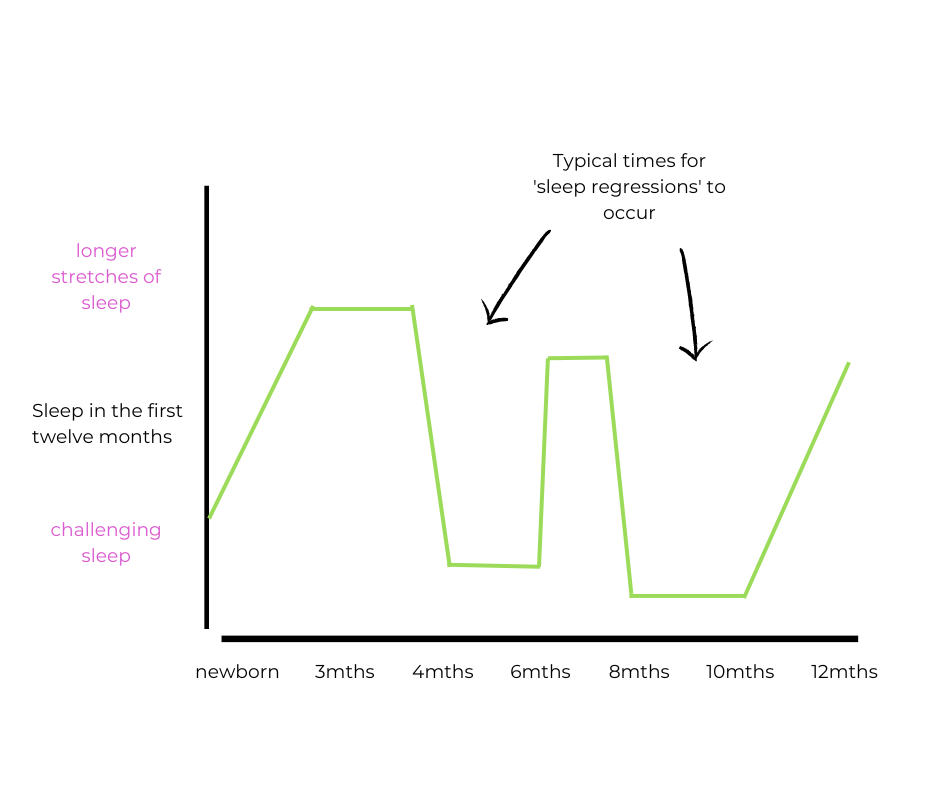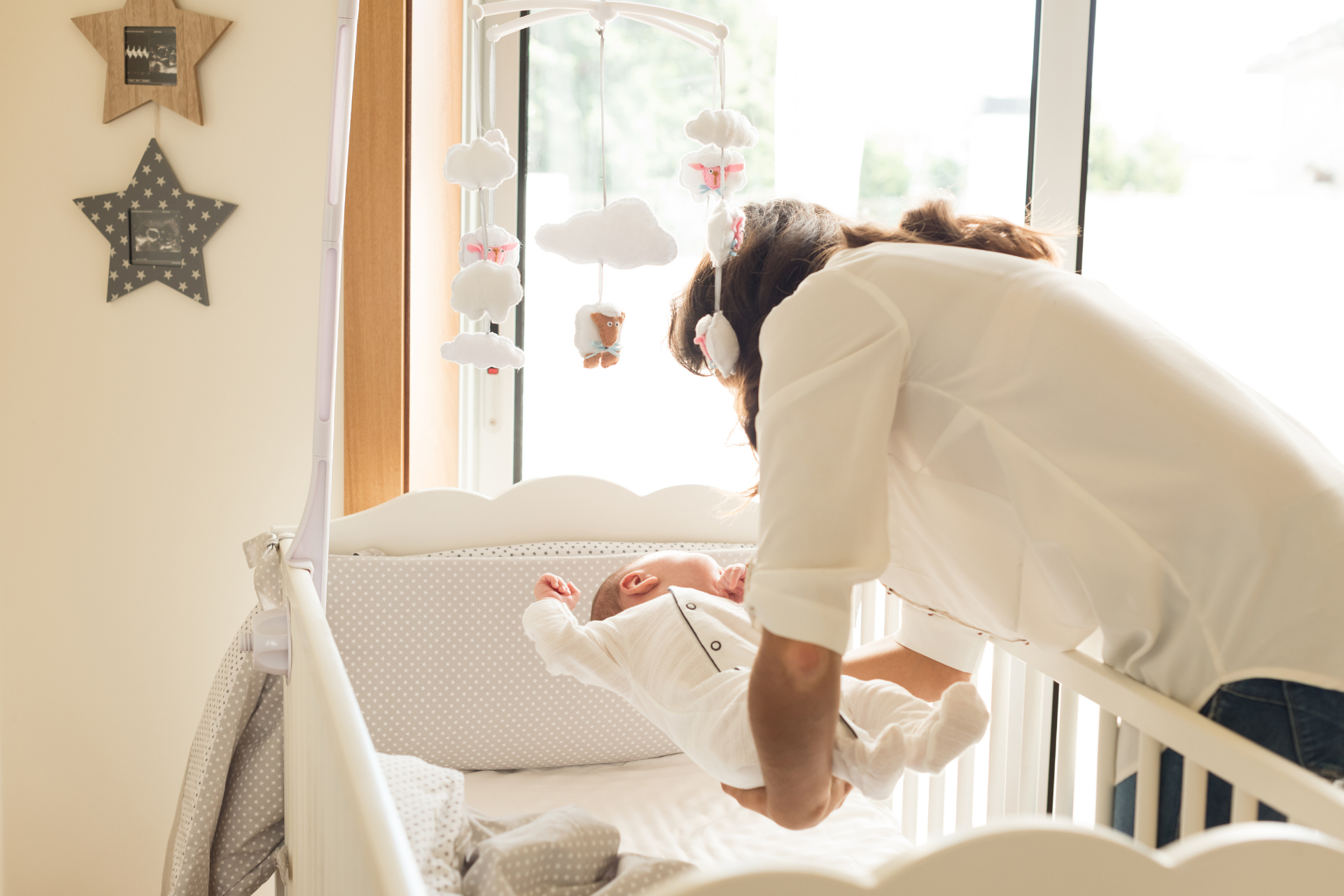What Is A Sleep Regression?
Perhaps your baby has been progressively sleeping longer stretches and you were getting four, five, or even six hour stretches at night and then they hit four months of age and start waking up every hour or two. You’re wondering, what on earth has gone wrong?
You do a Google search or ask in a Facebook group and find… it’s the four-month sleep regression.
What is a sleep regression and how do you get back to your long stretches?
What is a sleep regression?
The term sleep regression is a misnomer because this is a time of progression in your little one’s development. A sleep regression is a time when a sleep pattern becomes disrupted due to a period of rapid skills development or growth and/or a change in sleep needs.
Baby sleep isn’t linear, it doesn’t continue on a trend of constantly improving over time. There are sleep regressions, teething and illness along the way. Of course all young children eventually sleep through the night but it’s not a straight line to more sleep.

1. A change in sleep architecture
At four months of age your little one’s sleep architecture (the way sleep cycles are organised in the brain) changes. Newborns will cycle through two phases of sleep – very deep sleep and light, restless sleep.
At around 4 months of age their sleep cycles begin to change and mature meaning that they cycle through 2 phases of lighter sleep, 2 phases of deeper sleep and then 1 phase of rapid eye movement sleep (this is the phase where dreaming occurs and they may appear active in their sleep). With these changes they are more likely to wake in between cycles and need support to resettle. Please note that some babies need a lot more help to resettle than others due to their temperament, there is nothing wrong if your baby can’t self settle.
2. Developmental leaps and periods of growth
When the brain is learning new skills or your baby is going through a physical growth spurt there is an increased need for the long chain fatty acids found in milk. It is normal for an increase in night feeding to occur during this time and some babies will practice motor skills like crawling in their sleep too.
Eight to ten months of age is where you will commonly see a sleep regression due to developmental reasons with many gross motor (crawling, standing and walking for some), fine motor (the emergence of the pincer grip making the enjoyment of self-feeding possible) and social- emotional (a peak in separation anxiety due to a greater awareness of self) milestones happening.
Rest assured that this usually occurs in short phases and when part of normal development, it does not cause weeks or months of disturbance at a time.
3. A change in sleep needs
The other potential cause of a sleep regression is a change in sleep needs.
Sleep needs reduce over the first year, as a one year old obviously sleeps less than a newborn. These sleep needs can change suddenly, it can seem like one minute you’re in a good rhythm with your baby and the next everything has been turned on its head!
It can take your baby a week or two to adjust their sleep pattern to one that accommodates their new sleep needs. During this time of adjustment you may see some of the signs listed below…
Signs of a sleep regression?
Signs of a sleep regression include:
- Waking very frequently at night
- Excessive wakefulness during the night (split nights)
- Bedtime or nap resistance
- Usual settling methods seem not to be working
- Waking very upset in the night
What to do about a sleep regression…
1. Take the pressure off yourself to follow any sort of rules. You want to allow your little one to settle into their new sleep pattern. Following their cues and focusing on reducing anxiety around sleep is the best thing you can do in this situation.
2. Prioritise your own rest. Especially if your little one is quite fussy during the day. Take rest or time out whenever you can.
3. Get support if it continues past a couple of weeks. I often see mums whose little ones have been experiencing sleep challenges for months on end and it doesn’t need to be that way.
How do I know if it’s a sleep regression or a something else?
The general rule of thumb that I tell parents is that if your little one is continuing to show signs of a sleep regression after 2 weeks, seek some support.
Illness, teething, increased periods of growth and development or adjusting sleep patterns can last for a week or two but anything beyond that may indicate a medical concern or disrupted sleep pattern.
What is a disrupted sleep pattern?
From time to time little ones can fall into a sleep pattern where their timings for the day cause a disruption to the natural sleep regulation system.
A simple example of a disrupted sleep regulation system is jet lag. If you’ve ever been jet lagged you know it’s outside of your conscious control and you can be wide awake during the night and sleepy during the day – your body clock and sleep pressure (feelings of sleepiness) are out of whack and sleep is challenging!
When it comes to babies and toddlers they can unintentionally fall into a disrupted pattern when their sleep needs change, there has been illness or caregivers misread their sleep cues.
The result is sleep pressure that is not high enough to support longer stretches of sleep, confusion of the day-night pattern and/or a mis-match between when sleep pressure (sleepiness) is high and when sleep hormones in the body are high.
To be clear, if signs of a sleep regression have continued past a week or two, that is when we would be suspicious of a disrupted sleep pattern.
And in the case of a disrupted sleep pattern we need to look at your little one’s individual sleep needs and put timings into the day to get the sleep regulation system back on track >> Watch my Baby Sleep Masterclass if your suspect this might be your situation!




